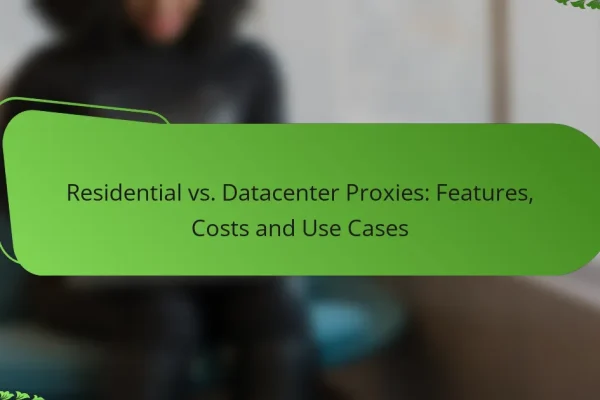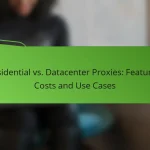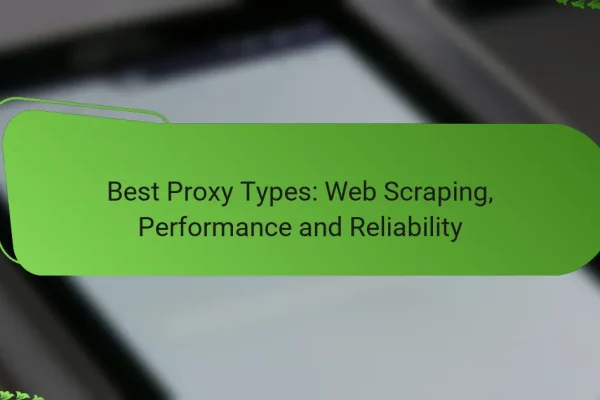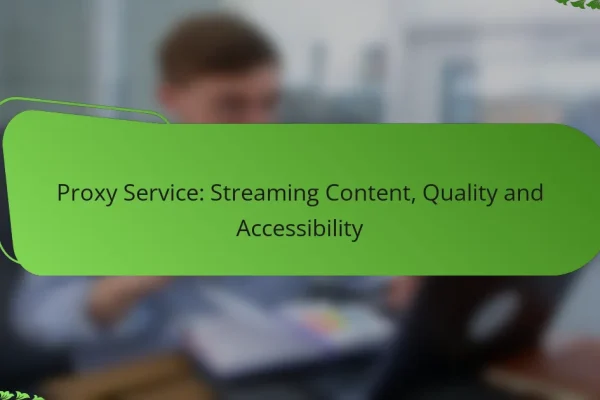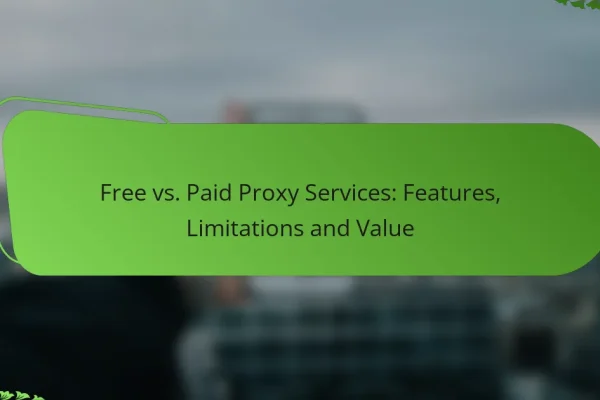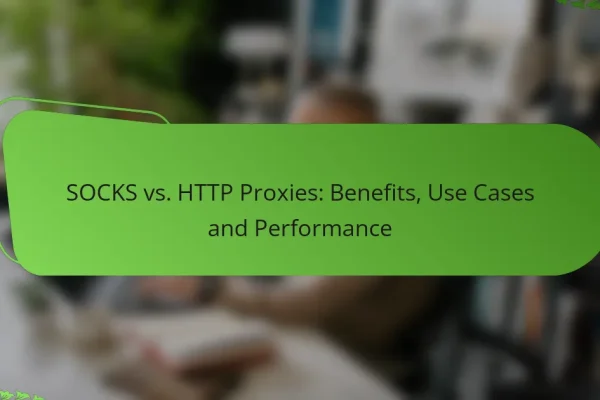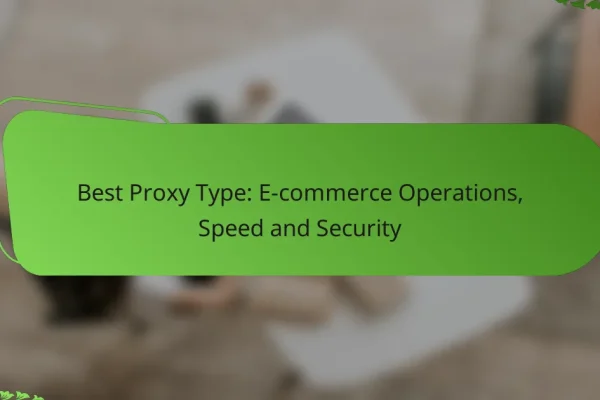What are the main types of proxy services?
The main types of proxy services include residential, datacenter, mobile, shared, and dedicated proxies. Each type serves different purposes and offers unique advantages depending on the user’s needs and the specific use case.
Residential proxies
Residential proxies use IP addresses assigned to real residential devices, making them appear as regular users to websites. This type of proxy is ideal for web scraping, ad verification, and accessing geo-restricted content without raising suspicion.
When using residential proxies, consider the cost, as they tend to be more expensive than other types due to their legitimacy and lower risk of being blocked. Ensure the provider has a large pool of IPs to avoid detection and maintain anonymity.
Datacenter proxies
Datacenter proxies originate from data centers and are not affiliated with Internet Service Providers (ISPs). They are generally faster and cheaper than residential proxies, making them suitable for tasks that require high speed, such as bulk data scraping or automated testing.
However, datacenter proxies can be easily identified and blocked by websites, so they are less effective for sensitive tasks. It’s advisable to rotate IPs frequently and use them in moderation to minimize the risk of being flagged.
Mobile proxies
Mobile proxies route traffic through mobile devices, providing IP addresses from mobile carriers. This type is beneficial for accessing mobile-specific content and services, as well as for testing mobile applications.
Mobile proxies are typically more expensive due to their limited availability and the need for real mobile devices. Users should ensure they choose a reliable provider to maintain connection stability and performance.
Shared proxies
Shared proxies are used by multiple users simultaneously, which can reduce costs significantly. They are suitable for less sensitive tasks where speed and anonymity are not critical, such as casual browsing or accessing public content.
However, shared proxies can lead to slower speeds and increased risk of IP bans due to shared usage. It’s important to choose a reputable provider to minimize these risks and ensure a better experience.
Dedicated proxies
Dedicated proxies are exclusively assigned to a single user, offering enhanced privacy and performance. They are ideal for high-stakes tasks like web scraping, account management, and any activity requiring consistent IP addresses.
While dedicated proxies come at a higher cost, they provide greater reliability and lower chances of being blocked. Users should consider their specific needs and budget when opting for dedicated services to maximize their investment.
How do residential proxies work?
Residential proxies operate by routing internet traffic through real residential IP addresses, making it appear as though the requests are coming from legitimate users. This method enhances anonymity and helps bypass restrictions or blocks imposed by websites.
IP address assignment
Residential proxies use IP addresses assigned by Internet Service Providers (ISPs) to real homes, which adds a layer of authenticity. When a user connects to a residential proxy, their requests are masked by the proxy’s IP address, which is recognized as a genuine residential address. This helps in avoiding detection and blocking by websites that monitor for suspicious activity.
Use cases for residential proxies
Residential proxies are commonly used for web scraping, ad verification, and accessing geo-restricted content. For instance, businesses may use these proxies to gather data from competitors without raising flags, while marketers can verify their ads’ visibility across different regions. Additionally, individuals may employ residential proxies to access streaming services that are limited to specific countries.
Another important use case is in social media management, where users can create multiple accounts without being flagged for suspicious behavior. This is particularly useful for businesses that need to manage various profiles for marketing or customer engagement purposes. Overall, residential proxies provide a versatile solution for maintaining privacy and accessing restricted online resources.
What are the benefits of using datacenter proxies?
Datacenter proxies offer significant advantages, including enhanced speed and cost savings. They are ideal for tasks that require high performance, such as web scraping, data mining, and accessing geo-restricted content.
Speed and performance
Datacenter proxies are known for their high-speed connections, often providing low latency and quick response times. This makes them suitable for activities like automated testing and bulk data collection, where speed is crucial.
Many datacenter proxies can achieve response times in the low tens of milliseconds, allowing users to perform tasks efficiently. When selecting a datacenter proxy, consider the provider’s infrastructure and server locations to ensure optimal performance.
Cost-effectiveness
One of the primary benefits of datacenter proxies is their affordability compared to residential proxies. Prices typically range from a few dollars to tens of dollars per month, depending on the service and bandwidth offered.
For businesses or individuals needing multiple IP addresses, datacenter proxies can be a budget-friendly option. However, it’s essential to evaluate the trade-offs in terms of anonymity and reliability, as datacenter IPs may be more easily detected and blocked by some websites.
How to choose the right proxy service?
Choosing the right proxy service involves assessing your specific needs, such as speed, security, and the type of tasks you plan to perform. Consider factors like the proxy type, pricing, and the provider’s reputation to ensure it aligns with your requirements.
Criteria for selection
When selecting a proxy service, consider the type of proxy you need, such as residential, datacenter, or mobile proxies. Each type serves different purposes; for instance, residential proxies are ideal for web scraping while datacenter proxies offer faster speeds for less sensitive tasks.
Evaluate the service’s speed and reliability, as these factors significantly impact performance. Look for providers that offer a money-back guarantee or trial period to test their service before committing.
Comparison of features
Compare features such as IP rotation, geographic location options, and the number of simultaneous connections allowed. Some services may offer dedicated IPs, which can enhance security and reduce the risk of bans during intensive tasks.
Pricing structures also vary widely; some providers charge monthly fees while others offer pay-as-you-go models. Assess your budget and usage patterns to find the most cost-effective solution that meets your needs.
What are the risks associated with proxy services?
Proxy services can expose users to various risks, including security vulnerabilities and legal issues. Understanding these risks is crucial for anyone considering the use of a proxy service.
Security concerns
Using proxy services can lead to significant security concerns, particularly if the provider is untrustworthy. Malicious proxies may intercept sensitive data, such as passwords and credit card information, putting users at risk of identity theft.
To mitigate these risks, choose reputable proxy providers that offer encryption and strong privacy policies. Always verify the provider’s credentials and look for user reviews to gauge their reliability.
Legal implications
Proxy services can also have legal implications, especially when used to bypass geographic restrictions or engage in activities that violate terms of service. In some jurisdictions, using a proxy to access restricted content can lead to fines or legal action.
It’s essential to familiarize yourself with local laws regarding internet usage and proxy services. For example, in the European Union, data protection regulations like GDPR may affect how proxies handle personal data, making compliance critical for both users and providers.
How do proxy services integrate with SaaS tools?
Proxy services enhance SaaS tools by acting as intermediaries that facilitate secure and efficient data exchange. They help manage user requests, improve performance, and ensure privacy while interacting with cloud-based applications.
Common integrations
Proxy services commonly integrate with various SaaS applications, including CRM systems, marketing platforms, and data analytics tools. For instance, a proxy can connect a marketing tool to multiple social media APIs, allowing for streamlined data collection and posting.
Other popular integrations involve project management software and customer support platforms, where proxies can help manage user access and optimize data flow between different services. This ensures that users can access necessary resources without compromising security.
Benefits for SaaS applications
Integrating proxy services with SaaS applications offers several advantages, such as enhanced security through IP masking and encryption. This protects sensitive data from potential breaches and ensures compliance with privacy regulations.
Additionally, proxies can improve performance by caching frequently accessed data, reducing load times, and minimizing server strain. This is particularly beneficial for applications that experience high traffic, as it can lead to a more responsive user experience.
What are the emerging trends in proxy services?
Emerging trends in proxy services focus on increasing user anonymity and technological advancements that enhance performance and security. As privacy concerns grow, more users are turning to proxy services to mask their online activities and protect their data.
Increased demand for anonymity
The demand for anonymity in online activities has surged as individuals and businesses seek to protect their identities. Users are increasingly aware of data privacy issues, leading to a rise in the use of proxies to hide IP addresses and encrypt internet traffic.
For example, many users now prefer residential proxies, which provide a higher level of anonymity compared to data center proxies. This shift is driven by the need to bypass geo-restrictions and avoid detection while engaging in activities like web scraping or accessing restricted content.
Advancements in proxy technology
Recent advancements in proxy technology have improved speed, reliability, and security features. Innovations such as rotating proxies and enhanced encryption methods allow users to maintain anonymity while enjoying seamless browsing experiences.
Additionally, the integration of artificial intelligence in proxy services helps optimize performance by automatically selecting the best proxy for specific tasks. This technology can significantly reduce latency and improve connection stability, making proxy services more efficient for users.
